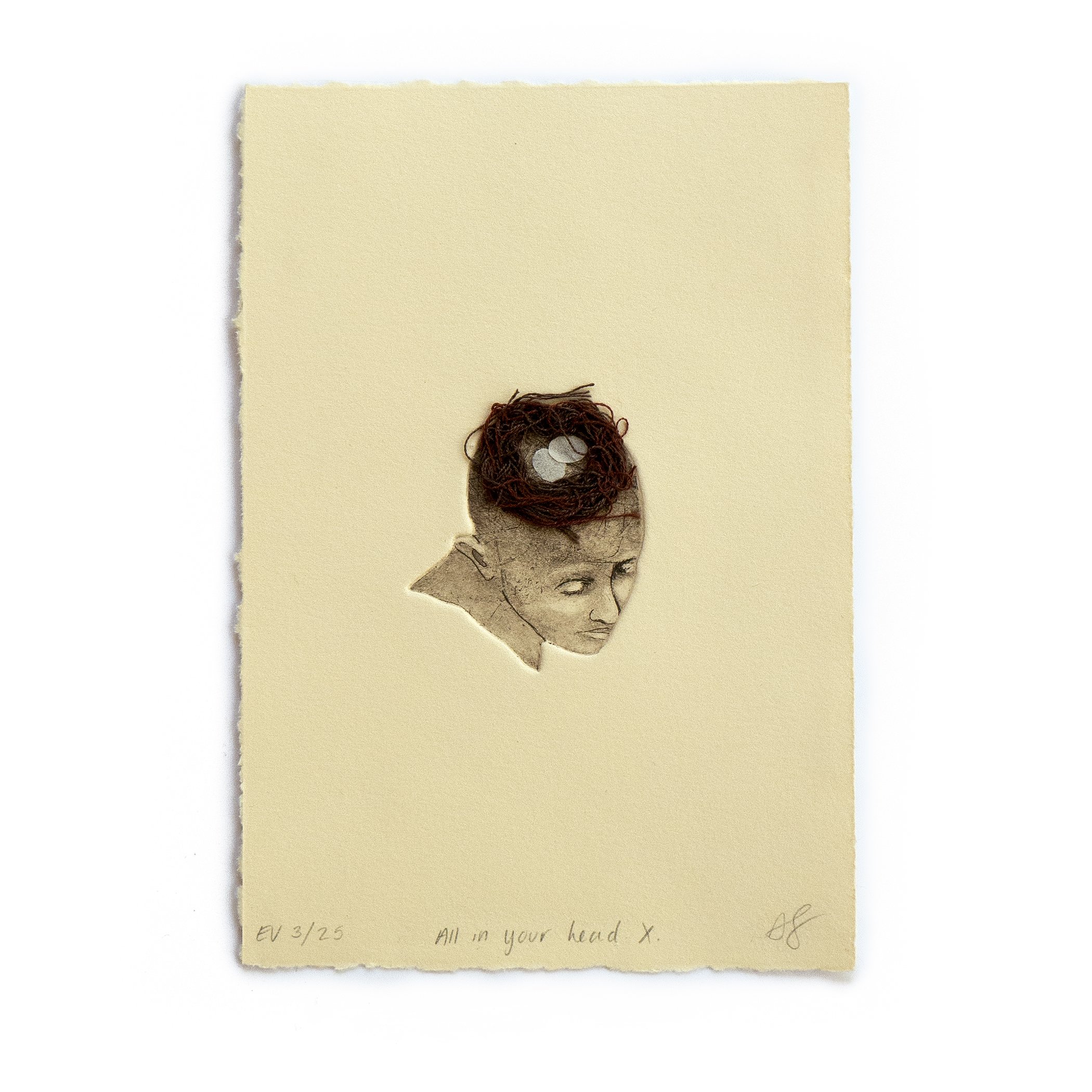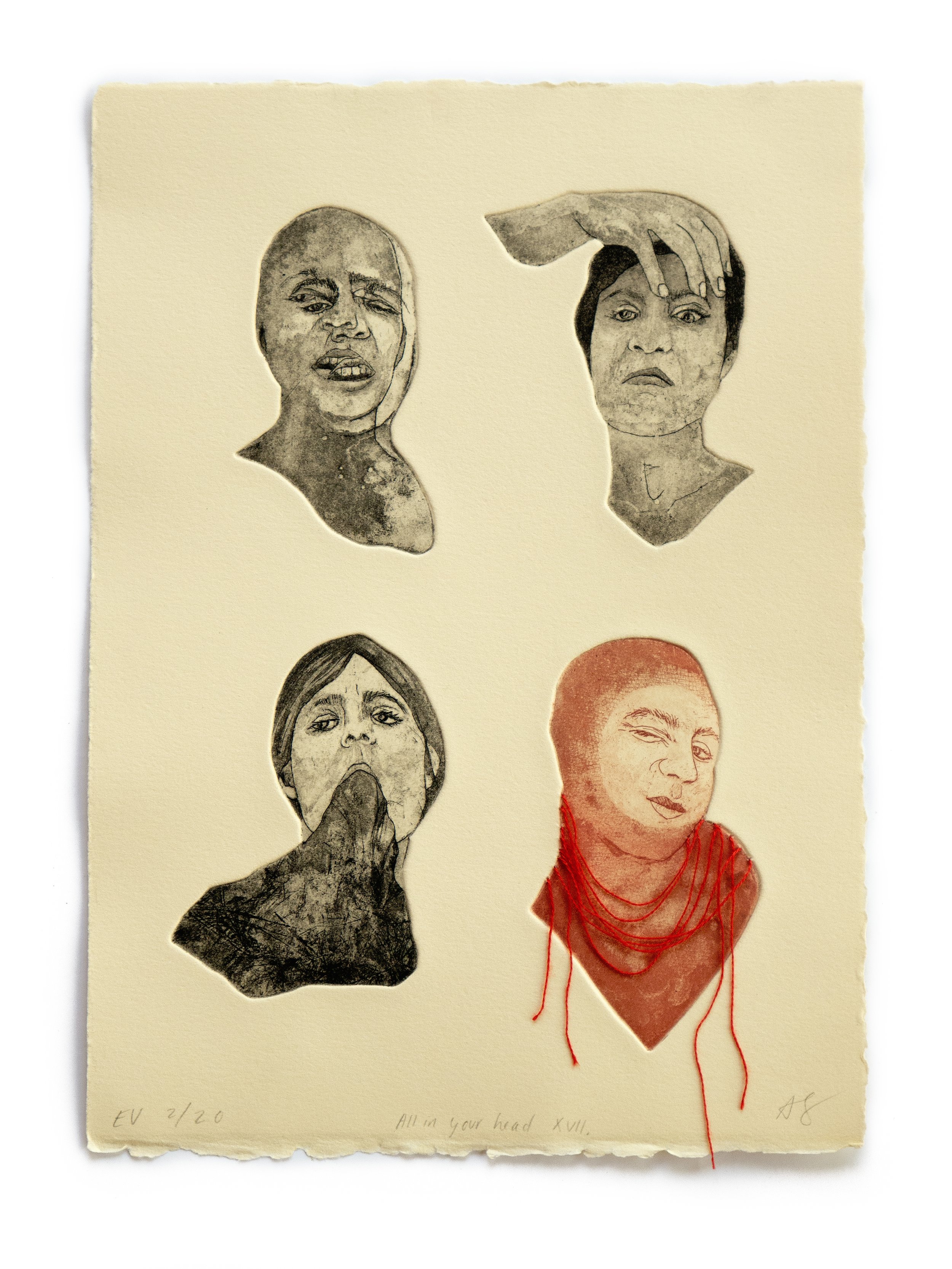All in Your Head | 2023
A solo exhibition at Hecho a Mano in Santa Fe, NM
“It’s all in your head” is a line that echoes through the experiences of Sick and Disabled folks navigating society and the medical system. It’s a phrase that Eliza Lutz has often heard from doctors during their own experience with chronic illness. They acknowledge the harm it does, as well as its inherent conflict:
“While it’s important to push back on the idea that Sick and Disabled folks are ‘faking’ or exaggerating their experiences as is implied by the ‘it’s all in your head’ line, we must do so without further marginalizing mental illness,” Lutz says. “To flatly reject this line just further affirms it—I’d rather embrace, reclaim, and subvert it.”
That’s what Lutz seeks to do in their upcoming show at Hecho a Mano. Rather than taking the idea at face value, Lutz asks their audience to respond with a, “Yes, and?”
Their work poses a series of questions: Why do we aim to divorce the mind from the body? Why do we downplay the mental toll that comes with dealing with physical symptoms like pain, nausea, dizziness, or fatigue, or from the social isolation and institutional discrimination that comes with it? Why do we treat physical illness as fundamentally different from mental illness, when enabling this divide is what makes a statement like “it’s all in your head” so harmful and dismissive? Why do we continue to view mental illness as less valid?
All in Your Head is an extension of past series inspired by Lutz’s lived experience of chronic illness and disability, “in all its in/visibility, fluidity and expansiveness,” Lutz says. Their Able and First Impressions series combine monoprinting techniques with embossing and embroidery. All in Your Head is a series of embroidered intaglio self-portraits that illustrate “how symptoms of chronic illness are felt, processed, and ever-living within the mind, not just the body.”
Lutz sees their chosen media as aligned with this theme, too. They are a longtime screen-printer, and recently began to explore other printmaking techniques while attending UNM, beginning in 2021. “I love printmaking because it is so exacting, despite this being very at odds with chronic illness,” Lutz says. “Where printmaking is all about being in control, I often feel very out of control with my body. Rather than finding this friction point a kind of restriction, I enjoy letting it guide my printing process — making it slower, less precise, and imperfect just like me. But there are also many parallels between printmaking and navigating the world with a disability that make this a perfect medium to explore these themes — in both you prepare for everything constantly, but things still never go quite as planned. Both require you to become a master adapter.”
Lutz’s printing process involves using cut and shaped copper plates, which leaves them with a lot of accumulated scraps. Rather than letting these scraps go to waste, they had the idea to create portraits in miniature. It also played into the show’s theme: “These scraps would typically be considered defective and unusable, as they are already scraped, oddly sized, and imperfect. Bringing my self-portrait out of these cast-off pieces felt like yet another way to push against the precision and perfection of printmaking — and the able-world at large — to reflect the chronically ill experience.”
Lutz’s monoprinting with etched plates creates prints that can’t be exactly replicated, which is by design. “Printmaking, not unlike the day-to-day of chronic illness symptoms, is all about repetition, but I want my work to embody the fluidity of this experience and how the same symptom or emotion is never felt the same exact way twice. Embroidering my pieces is an extension of this, as it allows me to pinpoint a small sliver of a feeling, knowing it can never be perfectly repeated, even if it is replicated over and over. Embroidery also enables me to express what is not visible, connecting the places where internal experience and external perception meet.”
Lutz wants their audience to understand that “it is all in your head, and all in my head, and that is just fine.” And while they’ve heard the line from doctors time and time again, it's something that comes even more frequently from within. “This internalized ableism is deeply rooted and very hard to unlearn,” they say. “This work is part of my ongoing unlearning process, and I invite the audience to join me in the difficult work of being kinder to ourselves.”
For more about the show visit: hechoamano.org/show/eliza-lutz-all-in-your-head






















